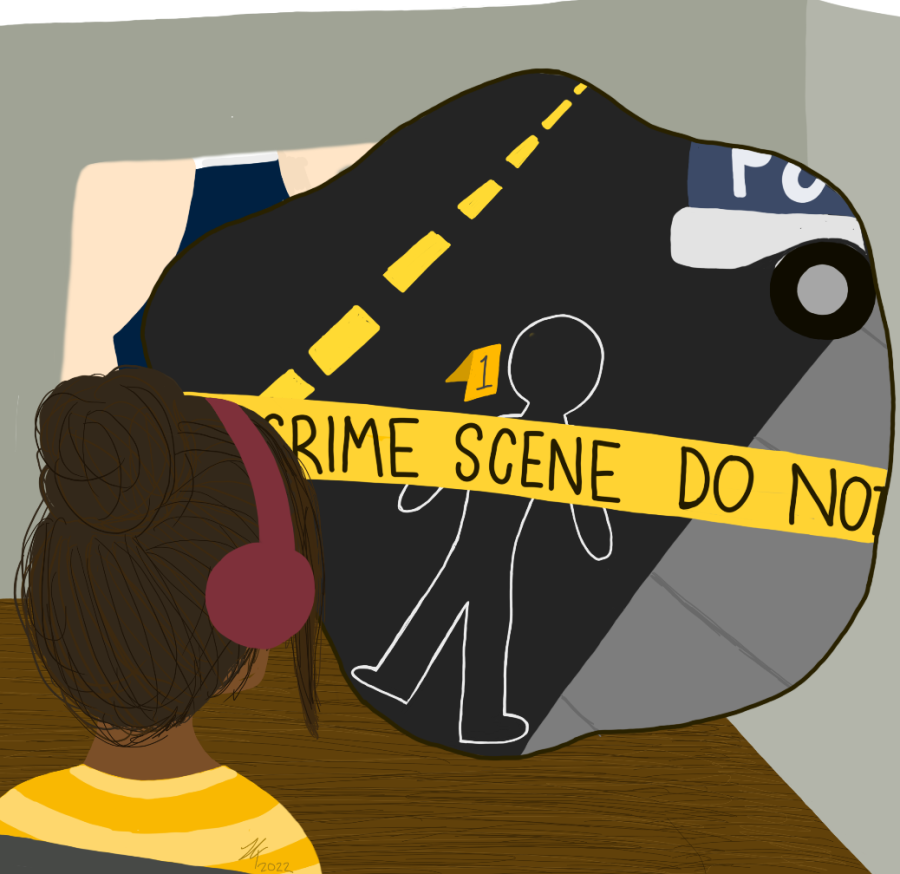The Ethics of True Crime
October 6, 2022
Is it even possible to measure the scope of impact that true crime content has had on the entertainment industry? According to Definitions.net, true crime is “a non-fiction literary and film genre in which the author examines an actual crime and details the actions of real people.” Since ancient times, people have been recounting the crimes (especially violent or dramatic ones) of the past. However, never before has true crime been produced at the same rapid pace that it is today. Shows like “Dateline,” “Making a Murderer” and Netflix’s “Conversations With a Killer: The Ted Bundy Tapes” are all unequivocal examples of the genre. True crime also manifests in wildly popular podcasts like “Serial,” “Crime Junkie,” and “My Favorite Murder.” Sophomore Ayla Lee says, “I listen to true crime podcasts, mostly while I do homework. You get the details of the case, but it can also be entertaining.”
This kind of material is consumed on a massive scale, and more rapidly than ever. SuperSummary.com estimates that “the average true crime consumer enjoys approximately 84 episodes of true crime TV, 44 chapters of true crime books, 34 episodes of true crime podcasts, and 20 true crime movies [per year].” Though these figures can seem excessive, it is crucial to consider the binge-able nature of entertainment nowadays, and the psychological thrill true crime administers to a person. An article from Vulture says, “…this style of true crime [is] addictive, which is the adjective its makers most crave. The stance of the voyeur, the dispassionate observer, is thrilling without being emotionally taxing for the viewer, who watches from a safe remove.”
Despite all of the fanfare surrounding this gruesome genre, concerns arise about the ethics, or even legality, of true crime. Firstly, is it ethical to be consuming stories of real people’s tragedies and murders as entertainment? Many argue that true crime content does not exist for the purpose of entertainment, but rather news, reporting on a story in a factual manner. However, senior Ethan Blazer disagrees, remarking that “true crime is definitely consumed as entertainment. You cannot do news on a story that’s forty years old, in the case of many of these murders. Only the investigative ones could be called news. Any investigations they do could be covered in three minutes, but instead it is covered over multiple hours.” In many ways, the popularization of true crime would render the genre fundamentally equivalent to any other fictional show on television, minus the fact that it recalls nonfiction events. When the line between documentary and celebrity is blurred, and gray areas of a true crime story are filled by fan speculation, fictionalized versions that manipulate the real narrative can spread like wildfire. Freshman Dylan Kim says, “A lot of media these days is overexaggerated. … Unless someone is hired to tell a story unbiased, a lot of the story can get twisted before it gets to our eyes and ears.” In a legal sense, this hearsay is harmful to a fair jurisdiction of the case. It also works to normalize a culture of not believing victims, or even romanticizing criminals on some dark corners of the internet. In the 1980s, when serial killer Ted Bundy was being put on trial (he eventually confessed to the murders of 30 women), some saw him as charismatic and attractive, and consequentially found it harder to see him capable of being a murderer. He was executed in 1989, but his legacy (and romanticization surrounding him) only grows stronger as more content is being produced about him.
When the media production process has the capability to distort aspects of the true account of a story, especially when involving a crime, we are begging the question: who should be allowed to control the narrative? Or worse, who should be allowed to make money off of telling the story of someone’s murder? Junior Zoe Iacomini remarks, “If the surviving family members of a victim do not feel comfortable with someone telling the story, then that wish should be respected. It would be best if there was a way you could take the profit of that story and put it towards an organization that helps people like the victim. If it was a queer youth murder, put it towards a queer homeless shelter.” There is also the concern of re-traumatizing surviving victims, or the family of a victim with the spread of their story. When it is considered that the production of true crime content is almost always for profit, this system of capitalizing on trauma and tragedy becomes even more malicious.
On the flip side, many believe true crime can be used as a power for good. Catching criminals, finding justice for victims, and reopening cold cases are among its capabilities. An article from LifeHacker reports, “So-called ‘armchair detectives’ have successfully helped reopen cold cases (the Golden State Killer being a particularly high-profile example); independently tracked down internet killers, as chronicled in the Netflix documentary series ‘Don’t F**k With Cats’; and identified hundreds of people suspected of taking part in the Jan. 6 attack on the Capitol.” True crime content can embolden people to seek closure in regards to any case or crime, then there are some benevolent powers with the spread of these stories.
Ultimately, true crime will persist. As Mashable reports, “…true crime is good business. Not only is the subject extraordinarily popular, but since facts can’t be protected by U.S. copyright law, the most sensational cases can be — and are — retold infinitely across formats.” As the conversation of ethics grows louder, we may start to see evolution in true crime. As individuals, it is our responsibility to consume true crime that pays respect victims and their communities, as well as accurately recalls the story.




